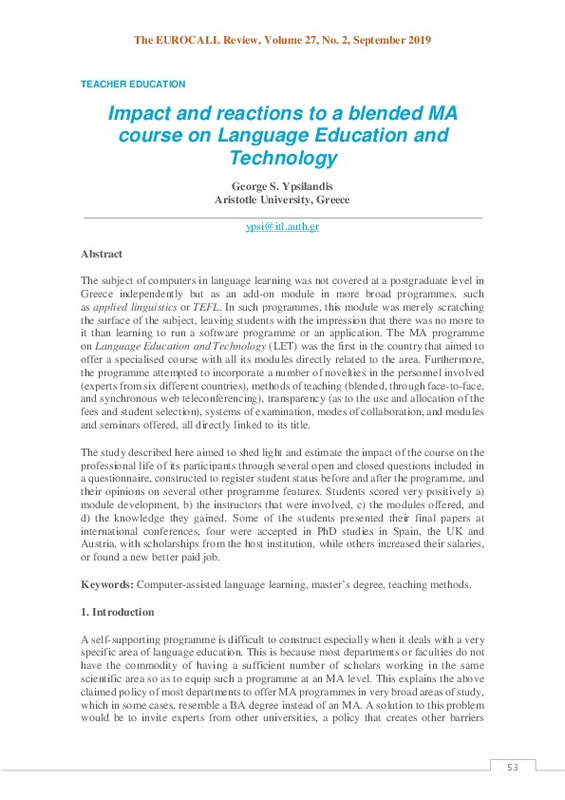Badawi, M. F. (2009). Using blended learning for enhanced EFL prospective teachers' pedagogical knowledge and performance. Proceedings of the Learning & Language Conference - The Spirit of the Age. Cairo: Ain Shams University.
Bonk, C.J. & Graham, C.R. (2006). The handbook of blended learning environments: Global perspectives, local designs. San Francisco: Jossey-Bass/Pfeiffer.
Chan, C. T. & Koh, Y.Y. (2008). Different Degrees of blending benefit students differently: A Pilot Study. Proceedings of the EDU-COM 2008 InternationalConference, 19-21 November 2008. Retrieved from http://ro.ecu.edu.au/ceducom/7.
[+]
Badawi, M. F. (2009). Using blended learning for enhanced EFL prospective teachers' pedagogical knowledge and performance. Proceedings of the Learning & Language Conference - The Spirit of the Age. Cairo: Ain Shams University.
Bonk, C.J. & Graham, C.R. (2006). The handbook of blended learning environments: Global perspectives, local designs. San Francisco: Jossey-Bass/Pfeiffer.
Chan, C. T. & Koh, Y.Y. (2008). Different Degrees of blending benefit students differently: A Pilot Study. Proceedings of the EDU-COM 2008 InternationalConference, 19-21 November 2008. Retrieved from http://ro.ecu.edu.au/ceducom/7.
Delialioglu, O. & Yilklirim, Z. (2007). Student's Perceptions on Effective Dimensions of Interactive Learning in a Blended Learning Environment. Educational Technology & Society, 10(2), 133-146.
Driscoll, M. (2002). Blended learning: Let's get beyond the hype. E-learning, 1(4), 1-4.
Garnham, C. & Kaleta, R. (2002) Introduction to hybrid courses. Teaching with Technology Today, 8(6), 1-2.
Garrison, D.R. & Kanuka, H. (2004). Blended learning: Uncovering its transformative potential in higher education. The Internet and Higher Education, 7(2), pp. 95-105. https://doi.org/10.1016/j.iheduc.2004.02.001
Gulbahar, Y. & Madran, O. (2009). Communication and collaboration, satisfaction, equity, and autonomy in blended learning environments: A case from Turkey. International Review of Research in Open and Distance Learning, 10(2), 1-22.
Islam, K. (2002). Is e-learning floundering: Identifying shortcomings and preparing for success. E-Learning Magazine, pp. 22-26
Kambakis-Vougiouklis, P., Vougiouklis, T. (2008). Bar instead of scale. Ratio Sociologica , 3, 49-56.
Kambakis-Vougiouklis, P., Nikolaidou, P. & Vougiouklis, T. (2017). Questionnaires in Linguistics Using the Bar and the H v-Structures. In Maturo, A., Hoskova-Mayerova, S., Soitu, D.T. & Kacprzyk, J. (Eds). Recent Trends in Social Systems: Quantitative Theories and Quantitative Models. Studies in Systems, Decision and Control, 66. Springer International Publishing AG Switzerland. https://doi.org/10.1007/978-3-319-40585-8_23
Li K. & Zhao J. (2004). The Theory and Applied Model of Blended Learning. E-Education Research, 7, 1-6.
Naaj, M., Nachouki, M. & Ankit, A. (2012). Evaluating student satisfaction with blended learning in a gender-segregated environment. Journal of InformationTechnology Education: Research, 11(1), 185-200. https://doi.org/10.28945/1692
Oliver, M. & K. Trigwell (2005). Can 'Blended Learning' Be Redeemed? E-Learning, 2, 17-26. https://doi.org/10.2304/elea.2005.2.1.17
Osguthorpe, R. & C.R. Graham (2003) . Blended Learning Environments, Definitions and Directions. The Quarterly Review of Distance Education, 4(3), pp. 227-233.
Picciano, A.G. (2006). Blended learning: Implications for growth and access. Journal of Asynchronous Learning Networks, 10(3), 95-102. https://doi.org/10.24059/olj.v10i3.1758
Singh, H., & Reed, C. (2001). A white paper: Achieving success with blended learning. Centra software, 1, 1-11.
So, H. J. & Brush, T.A. (2008). Student perceptions of collaborative learning, social presence and satisfaction in a blended learning environment: Relationships and critical factors. Computers & Education, 51(1), 318-336. https://doi.org/10.1016/j.compedu.2007.05.009
Thorne, K. (2003). Blended learning: How to integrate online and traditional learning. London: Kogan Page.
Ypsilandis, G.S. (2005). Language Teaching, Language Learning: Current Trends and Practices. Keynote published with the proceedings of the 1st ESP Conference on Teaching English For Specific Purposes: A Trend or A Demand? Ziti Publications, pp. 31-40.
Ypsilandis, G.S. (2006). On feedback provision strategies in CALL software. Keynote published in the Proceedings of the 5th International Conference on Motivation in Learning Language for Specific and Academic Purposes. Thessaloniki: University of Macedonia Press.
Ypsilandis, G.S. (2018). The MA program on Language Education and Technology: A Global Endeavour. Proceedings of the International Conference on Innovation in Language Learning. Pixel Publications. Available from https://conference.pixel-online.net/ICT4LL.
[-]








